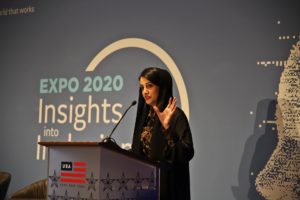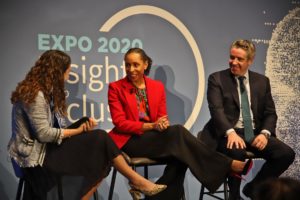GE Hosts Thought Leadership Event For Diversity Experts During Expo 2020 Dubai’s Tolerance & Inclusivity Week
GE (NYSE:GE)hosted a thought leadership event titled ‘Insights into Inclusion’ at Expo 2020 Dubai. Aligned to the Expo’s Tolerance and Inclusivity theme week, the event brought together over 50leaders and diversity experts from global and local companies to discuss how organizations can foster a diverse workplace for the next generation.
Delivering the opening remarks, Dr. Dalya Al Muthanna, President – GE UAE, and Global Chief of Strategy & Operations, GE International Markets said: “We are a global company, but we operate locally, think locally, and engage locally. The themes of tolerance, diversity, and inclusion are familiar to UAE citizens and residents, and they are critical to GE as well. We believe in fostering an inclusive culture and seek to empower our people so they feel accepted, respected and belong. We know that embracing diverse teams and perspectives better equips us to serve our customers and communities, and ultimately contributes to our ambition to build a world that works.”
Following this, a moderated discussion with John Slattery, CEO of GE Aviation, and Tanya Spencer, Chief Diversity Officer of GE Gas Power was held, where they shared their views on what diversity means to them and their businesses. The session was moderated by GE Renewable Energy’s Suraya Watfa, a young leader in GE’s I&D efforts, who brought a Gen Z perspective to the discussion. They offered insights into why diversity and inclusion are such important engines of success for their businesses, and how the next generation will be the drivers of innovation for the organization.
You can view the replay of the event here: Insights into Inclusion.
After hearing from the leaders, in a truly collaborative discussion, the event engaged all attendees by dividing them five groups, each assigned to a specific aspect of diversity and inclusion. Together, leaders from PWC, Boeing, Coca-Cola, Accenture, Womanity, IBM, the US Department of State and others explored the themes, with the goal of helping organizations cultivate a more inclusive environment. Key takeaways from each working group are below:
- Language and Communication: Awareness around language is critical to the success of inclusion, both at an individual and organization level. Actions included training, and making sure contracts, job descriptions, and other company language is neutral. The need for consciousness at all levels, and not only at a leadership level, was stressed.
- Empowerment and Advocacy: For inclusion to become the norm, participants suggested the need for policy and procedural changes. In addition, employees must own diversity and inclusion and lead by example to give a voice to people and celebrate each other’s differences.This means not only listening to other opinions but implementing them into business decisions. Another important takeaway was the need to eliminate assumptions.
- Building Cultural Connections: To foster a diverse and inclusive workplace, companies can create Employee Resource Groups (ERGs)to bring people with shared characteristics or interests together, with an aim of educating the wider organization on specific topics such as gender, ethnicity, neurodiversity and access, age, religious and cultural affiliations and more. To bridge cultures, it is important to create awareness across cultures and behaviors.
- Unconscious Bias: Bias exists across organizations in numerous forms, which can be detrimental to the mental health and wellbeing of employees, and their career progression. From developing effective talent and retention frameworks to providing unconscious bias training, it is crucial to become more aware of how business is conducted. Actions include ensuring diverse slates of candidates and interviewers are present while hiring, geographic distribution of leadership roles, and the understand that there are many ways of “doing business.”
- Breaking Stereotypes: Addressing stereotyping from the time an employee joins an organization and providing role models and cross-gender and reverse mentoring opportunities across different roles will help to build a more diverse and inclusive culture. Additionally,organizations must become more flexible to support new ways of working.
In order to ensure a more inclusive and diverse workplace, GE is committed to focusing on these themes to support the new workplace of the future. In addition to leading conversations on diversity and inclusion, GE believes in taking action that extend to employees, the wider community, and the planet in order to attract and retain tomorrow’s talent.








